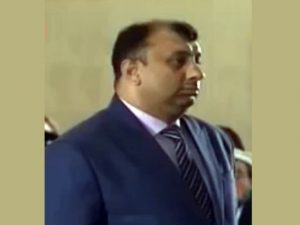The former official of the ISI who was killed “singlehandedly destroyed Da’ish in Punjab.”
As a result of his participation in various operations directed against Daesh and al Qaeda, Naveed Sadiq earned the reputation of being a “terrorist’s nightmare.”

KARACHI:
According to sources, a decorated senior intelligence officer who was killed earlier this week in a terrorist shooting in southern Punjab was a “nightmare for Da’ish” because he “single-handedly” prevented the Khorasan enterprise of the Middle Eastern terrorist group from gaining a foothold in the province.
On January 3, a terrorist named Umar Khan, the son of Muhammad Akram Khan, shot and killed Inspector Nasir Abbas and Muhammad Naveed Sadiq, a director at the Inter-Services Intelligence (ISI), at the Bismillah Restaurant on the National Highway in Pirowal, Khanewal.
The attack was quickly blamed on the terrorist organisation Lashkar-e-Khorasan, which is relatively obscure. With its spokesperson Muhammad Khorasni, the banned Tehreek-e-Taliban Pakistan (TTP) cast doubt on the assertion within hours, claiming that a “secret squad” of the TTP was responsible for the horrific attack.
The TTP’s credit claim was delayed, according to Khorasni, because to a “delay in information from the ground.” Both assertions, however, seem to be in doubt given that the alleged attacker was a “intelligence source” for the terrorist organisation Al Qaeda and had previously had tea with the two officials at the restaurant. He could have been a double agent, it is thought.
After finishing their tea, they were on their way to the restaurant’s parking lot when the “source” abruptly produced a revolver and shot the ISI officers, according to the FIR. After the fatal shooting, he made his getaway on a motorcycle.
Despite technical advancements, it is still common for intelligence sleuths and secret organisations to nurture informants within terrorist networks in order to thwart their schemes.
Maintaining a low profile, Director General ISI Lt Gen Nadeem Ahmed Anjum travelled to Lahore to attend the funeral of the martyred intelligence officials among other high military authorities and government officials.
Naveed Sadiq Shaheed had more than 16 years of experience working for the top intelligence agency and was Officer Commanding of the ISI’s counterterrorism division for the Multan Region.
The sources told The Express Tribune that “the valiant son of the soil” has engaged in numerous operations against Da’ish and al Qaeda throughout Punjab. The sources continued, “He became a terrorists’ nightmare during the war against terrorism. “He had beaten Da’ish by himself, particularly in Punjab.”
President Arif Alvi presented Naveed Sadiq with the Sitara-e-Shujaat, the second-highest civil honour in Pakistan, at a special investiture ceremony held at the Presidency in March 2021.
The citation that referred to him as a “officer of exceptional valour” stated that “Naveed Sadiq successfully traced the residence of Da’ish’s deputy commander in Faisalabad and launched a raid together with his team.” After a fierce battle, “Naveed Sadiq and his crew neutralised the terrorists,” it continued.
Naveed Sadiq valiantly fought suicidal terrorists during another operation in Gujranwala. The citation states that “He and his crew risked their lives and successfully removed the two suicide terrorists from the densely populated regions of the city before neutralising them.”
The sources claim that Naveed Sadiq Shaheed, who had access to cutting-edge intelligence tools and was endowed with extraordinary bravery, had always been on the enemies’ murder list.
With almost 16 years, Inspector Nasir Abbas Shaheed worked for the ISI as well. He was the mainstay of operations against Da’ish, al Qaeda, and other terrorist organisations in South Punjab while he was stationed in Multan, according to the reports.
The sources further stated that “he had a very deep entry into terrorist organisations through a source network, which helped a lot of counterterrorism operations.” The courageous son of the land, who consistently fought on the front, was also on the terrorist organisations’ hit list for this reason.
The sources stated that “Naveed Sadiq has left behind a great legacy” and that the “unsung heroics of these cops will live forever.”
Since the banned TTP openly tore up a ceasefire agreement that they had never completely fulfilled in November of last year, there has been an increase in terrorist attacks in Pakistan. Since the collapse of the cease-fire, the group, which enjoys de facto political refuge in the Afghanistan ruled by the Taliban, has carried out scores of attacks in various places around the nation.
The National Security Committee, the nation’s highest body for security and foreign policy, has met twice in response to the rise in TTP attacks and pledged that “no country will be allowed to provide sanctuaries and facilitation to terrorists and Pakistan reserves all rights in that respect to safeguard her people.”
General Syed Asim Munir, head of the army, presided over the 254th Corps Commanders’ Conference, which had made the decision to “battle against terrorists without making any distinctions and eliminate this problem as per the aspirations of the people of Pakistan.”










































